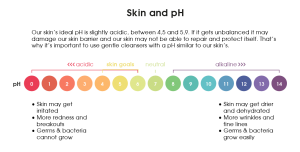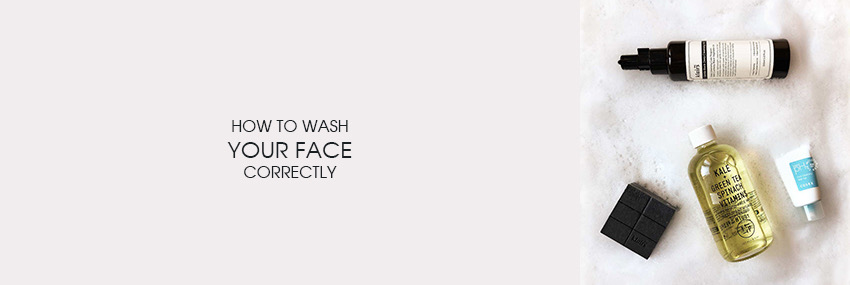Did you know that washing your face correctly is basic for a healthy skin? Most people make several mistakes when washing their face, so their skincare routines are not as effective as they should and they may even compromise their skin barrier. No more mistakes, today you’ll learn how to wash your face correctly!
Hello, hello! How are you? On today’s post I will help you to continue learning about your skin and how you should take care of it properly. In this case, I will tell you in more detail why it is important to wash and exfoliate your face and how you should do it.
Very often, when you have told me about your beauty routines, I have noticed that you have many doubts about how to properly wash your face and this leads to problems such as dehydration and acne.
It is not easy to summarize all that surrounds the cleansing of the skin in just one post, and I will certainly publish other ones on this subject later. In any case, to get our hands on cleansing, the topics I will discuss in this post are the following:
- Why you need to cleanse your skin.
- How to wash your face correctly.
- Exfoliation: is it important?
- Types of exfoliation.
1. WHY YOU NEED TO CLEANSE YOUR SKIN.
Sometimes, the most basic issues may seem very obvious, but it is important to review why we do what we do. During the day, our skin faces many elements that get it damaged and dirty: pollution, dust, sand, rain, wind, clothes, our own hands, etc. All this ends up depositing to a greater or lesser extent on our epidermis, spreading bacteria and other microorganisms that can cause infections, acne and irritations if we do not remove them. In addition, all these particles end up damaging our skin barrier, obstructing our pores, contributing to our skin’s dehydration and providing us with a a less healthy appearance.
As I have told you on other occasions, cleansing is the first phase of your beauty routine, and therefore it is crucial for the rest of it to make sense. If you do not wash your skin correctly, moisturizing it will not make sense, as your skin will not be able to absorb correctly the serums and moisturizer, and you also contribute to keep all the microorganisms that got on your face living happily ever after.
We shouldn’t just wash our faces daily, but we have to do it at least twice a day: in the morning and at night. When you wash your face in the morning you aren’t only preparing your skin for the other products of your beauty routine, but with the cleanse you remove all the particles that have been deposited during the night (being in contact with the pillow, for example) and other products that you could use in your night routine (such as the sleep masks, which I told you about in this post), masks designed to work all night and be removed in the morning. On the other hand, when you wash your face at night you get to remove the remains of sunscreen and makeup, in addition to the other particles that have been deposited on your skin throughout the day. And what happens if you don’t wash your face? All those particles remain on your skin, unbalancing its pH and favoring the presence of microorganisms that damage it, so that you will end up with acne or with an oilier or dehydrated skin.
2. HOW TO WASH YOUR FACE CORRECTLY.
Washing your face may seem like something very simple and obvious, but there’s more into it than it may seem. We might think that washing our faces is simply pouring some water and using any soap, but it is not. We always have to look for the right products for our skin type, not all cleansers are the same and they do not react equally on our face. Generally speaking, it is advisable to look for cleansers with a low (lightly acidic) pH, since they do not dehydrate our skin by interacting well with the hydrolipidic barrier, which also has a relatively low pH. In addition, cleansers with a more acidic pH are much better for the most sensitive skins, making them a top choice for everyone. Lately I’m in love with these two low pH cleansers that you should definitely check out: the COSRX Low pH Good Morning Gel Cleanser, which you can get on Wishtrend, on Yesstyle and on Jolse and the ByWishtrend Acid-Duo 2% Mild Gel Cleanser, which you can find on Wishtrend and on Yesstyle.
In your mornings you can do a simple cleanse with a water-based cleanser, but in your night routines you should always do a double cleanse. A reminder is never too much, and for those of you who do not know about double cleansing, you must be aware that it consists in using first an oil-based product (such as milks and cleansing oils) and then a water-based cleanser to conclude. With the first phase of the cleanse you get to remove the remains of makeup and sunscreen, as well as all other oil-soluble particles. With the second phase of this cleanse what you get is to remove the remains of the first cleanser, as well as all other water-soluble particles (such as sweat).
Although in this post I talked about the subject in detail, it is never bad to recall what we know about how to use cleansing products properly. First, you must take a small amount of the oil-based cleanser and spread it over a dry face with the fingertips, massaging gently and carefully. Then, you will remove the remains of the product with lukewarm water. Then, moisten the skin again and apply a small amount of water-based cleanser to your skin, massaging again. Then you just have to rinse it with more water and continue with the rest of your beauty routine: toner, serum and moisturizer (and, if it’s your morning routine, sunscreen).
I’ve seen that you use micellar water much more often than I like. And why don’t I like micellar water? In my experience, when I used it, it left my skin very dehydrated. It is true that it is effective to remove the remains of makeup, but so are oil-based cleaners and they do not dehydrate your skin that much, so it is a simple change and your skin will be so thankful. In any case, remember that you must always rinse it after using it.

3. EXFOLIATION: IS IT IMPORTANT?
This happened to all of us: we notice that our skin is especially oily, we have a scrub at hand and start using it non-stop, thinking it will cleanse us better and get our skin to stop being so oily, but it doesn’t.
You may remember from this post that our skin has three layers: hypodermis, dermis and epidermis, and that the latter has in its outermost part a hydrolipidic barrier (the skin barrier) formed by an emulsion of water and oil with a slightly acid pH. This hydrolipidic barrier is in charge of protecting us against all the microorganisms that I have been talking about. If we abuse cleansing, what we do is to excessively remove the oil from this layer, so that our skin gets dehydrated and begins to generate an excessive amount of oil to try to recover its balance (and thus becoming oilier). If you exfoliate every day, you contribute to the imbalance of your skin barrier.
This does not mean that you should not exfoliate, exfoliation is essential to keep your skin looking gorgeous. With exfoliation you remove the dead skins that are progressively deposited on the surface of the skin, unclogging the pores (to prevent the skin from getting oilier) and allowing the rest of your beauty routine to be more effective (since the products destined to nourish and hydrate it will be able to penetrate more easily). Over the years, it takes more time for our skin to regenerate, so the exfoliants are an excellent help to have a radiant appearance.
Of course, as it happens with all skin care products, there are a lot of types of exfoliants, but in the next section I will help you to better understand the basic types of exfoliants so you know how to care for your skin much better.
4. TYPES OF EXFOLIATION.
There are two fundamental types of exfoliants: physical and chemical. I prefer to use chemical exfoliants, since they are gentler with our skin.
The physical exfoliants are those that use certain particles or mechanical tools to remove the dead cells of our skin (like the Foreo, for example). Generally speaking, when you think of an exfoliant you think of one of this type, such as those cleansing gels that include small beads that, when massaging our skin, drag the dead cells. In addition, in many cases, these microparticles are not biodegradable, so when using them we contribute to pollute the oceans. As long as you use them carefully and not too often, they are okay. However, abusing this type of exfoliation can be very damaging, especially for those with oily or sensitive skin. The main problem with these scrubs is that their abrasion can lead to irritation or redness, so I prefer to use chemical exfoliants.
I already told you about the chemical exfoliants in this post. There are two fundamental types: Alpha Hydroxy Acids (AHA) and Beta Hydroxy Acids (BHA). This type of exfoliation is very effective, but we must use it carefully or else we may seriously damage our skin. Since the chemical exfoliants make the skin more photosensitive, it is better to use them at night and during the winter, because in summer, if you expose yourself to the sun, they can cause hyperpigmentation and stains and you will be able to burn more easily.
The best known AHAs are lactic acid and glycolic acid (the first one being softer than the second one), although there are many others. They are dissolve the bonds that keep the dead cells attached to the surface of the skin, allowing them to detach. Bear in mind that these products are potentially irritating (after all, they are acids), so you should not combine them with other products such as vitamin C, also potentially irritating. Moreover, because of their nature, the AHAs make the skin more photosensitive, so you have to be more careful with the sun during the next week after use (although you know you should use sunscreen daily). If you want to start using AHAs I would recommend you to go with The Ordinary Glycolic Acid 7% Toning Solution, which you can get on DECIEM (recommended).
On the other hand, the best known BHA is salicylic acid, well known to those who have the skin with a acneic tendency. And why do these products work so well? Because the BHAs are fat soluble, so they can penetrate the skin in depth, cleaning the pores. If you want to try a nice BHA serum I would recommend you to try the Paula’s Choice skin Perfecting 2% BHA Liquid Exfoliant, available on Paula’s Choice and on Niche Beauty.
Tell me, did you know how to wash your face correctly? As I told you, it may seem something very simple but it is never wrong to read some tricks that helps us to have a healthier and younger skin. I will continue to share other posts related to the topic to keep learning about how to properly care for your skin.
Did you like this post? Do you want to continue learning about beauty, cosmetics and skin care? Then surely you are interested to take a look at these posts:
Do you want to learn to take better care of your skin? You can see an index of all my informative posts here.● Follow me on Instagram, Facebook, TikTok and Pinterest.
● Share, comment and like my posts on social media.
● Shop through my links to help me keep up with this blog.

I’m Nacho and I’m passionate about skincare. I really enjoy learning and sharing my knowledge about skincare and I read scientific papers so you don’t have to. I want to break stereotypes because I believe skincare has no gender: skin is skin.



Awesome thanks Nacho! I’ll look into the acid guide 🙂
Thank you so much for your support! I’m glad to help you! 😊
All the best,
Nacho.
Hi Nacho
I was wondering if I could get your input on a couple things. I am currently looking into the 10 step Korean skin care routine.
I was wondering:
– how long should I wait between each layer of product and step?
– Should I wash off a chemical exfoliator before putting on my toner/essence? For example, after double cleansing, and then putting on a layer of Cosrx Blackhead power liquid do I wait a couple minutes and then wash or rinse it off or do I leave it on?
– can I combine aha and bha products in one routine? Or should I use them separately? Like if I wanted to use both the cosrx blackhead power liquid wait a couple minutes and then use the ordinary’s 7% glycolic acid toner, would that be ok?
Hi Pauline! Welcome to my blog! 😊
There’s no need to wait between products, the ideal is to apply them continuously. The only exception would be exfoliants (which need to work on your skin for a few minutes) and masks (which, understandably, need to be used for a while too).
As you can see in my guide about acids, you don’t need to wash off exfoliators, you should just leave it on and keep on with the rest of your routine (that’s generally speaking, you should always follow the manufacturer’s instructions). In that particular post I also mention that you shouldn’t combine different acids, check it out and I’m sure you’ll have a much more clear understanding on how to use them 😊
All the best,
Nacho.